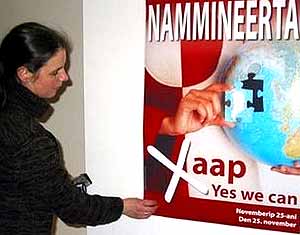13.12.2008
December 04, 2008 (The date of publication in Russian)
Ruslan Kostyuk
GREENLAND MAKES A STEP TOWARDS INDEPENDENCE
Islanders rely upon advantages of global warming
 Last week, the residents of the largest world's island expressed their commitment to expand the status of autonomy at a general referendum. Greenland, with a territory exceeding 2,175 mln sq. km and washed by the Arctic and the Atlantic, is inhabited by not more than 40,000 people, mostly residing along the southern coastline of the huge island.
Last week, the residents of the largest world's island expressed their commitment to expand the status of autonomy at a general referendum. Greenland, with a territory exceeding 2,175 mln sq. km and washed by the Arctic and the Atlantic, is inhabited by not more than 40,000 people, mostly residing along the southern coastline of the huge island.
In the XVIII century, Greenland was integrated into the Danish Kingdom. However, the Scandinavian colonization was rather mild – due to severe natural and climatic conditions. In 1950s, Greenland acquired the status of an overseas territory. In 1979, it was recognized as a self-governed territory (community) within the kingdom. This status enabled the Greenlanders to elect a representative body and to establish an autonomous government. The local administration took over heath care, primary and secondary education and welfare. In mid-1980s, the island's administration was granted a right for control of fishing business at the coastline. This was a significant step towards real self-government, as at least one quarter of the islanders is engaged in fishing or fish processing. Fishing industry remains the major article of Greenlandic exports, having a world lead in shrimp farming. Beside, the island maintains a strong base of livestock agriculture, specializing in sheep and stag breeding.
Greenland owes its major geopolitical advantage to its strategic location in the Arctic. While global warming fuels up the struggle for the Arctic, the factor of Greenland is becoming increasingly important in both political and economic aspects. Greenland's soil is rich with oil, gas, zinc, lead, and nickel, also containing chromium, gold, silver, and anthracite.
On the background of global warming, perspectives of reclamation of Greenland's natural reserves are becoming quite real, and this factor spectacularly influences the separatist sentiment. However, in case the level of the ocean rapidly elevates, most of the populated areas are likely to be covered with water. Under those circumstances, the lucky islanders who manage to save themselves will be hardly focused on independence.
Not surprisingly, the isle's incumbent government, formed by social democrats and socialists, does not raise the issue of secession. Still, 75% of the recent poll's respondents favor a qualitative expansion of autonomy. After the referendum, officially put into force in mid-June, Greenland is going to expand its independence in 30 various spheres, including justice, coast watch, and management of national resources. Since that time, one half of the country's bounty of nature will belong to the Greenlanders, while the Eskimo language will become official.
It is noteworthy that the official Copenhagen was forced to concede to the demands of the island economists, proactively accepting their arguments. On the other hand, the leftist-dominated Eskimo parties are still unprepared to break connections with the Danish crown. In any case, two thirds of the island's budgets are comprised from incomes of the "mother country". Still, local socialists maintain commitment for full independence. That is why the islanders have attained expansion of competence in foreign policy affairs. This may eventually impede primarily the US interests on the isle. Since World War II, the town of Thule has served as a base of the US Air Force. The relations between Greenland's leftist government and the United States and NATO are lukewarm. Therefore, the issue of the status, as well as the costs of maintenance of the US base that had been essential for Pentagon for many years, may be raised in the nearest time.
Number of shows: 1206
 ENG
ENG 

 ENG
ENG 
